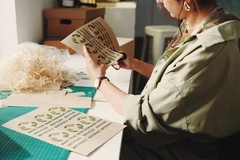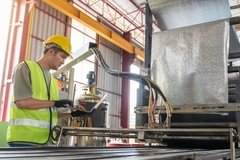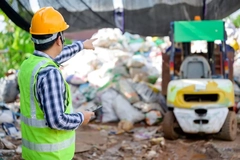ExxonMobil lawsuit: CIEL attorney questions petrochemical giant’s offensive strategy

ExxonMobil has filed a lawsuit against California Attorney General Rob Bonta and several environmental groups, alleging they have “defamed” the global oil and chemical company in an ongoing court battle over its plastic waste and advanced recycling operations.
We speak to Patrick Boyle, corporate accountability attorney at the Center for International Environmental Law (CIEL), for his view on this intensifying dispute. Boyle works for CIEL’s Fossil Economy Program and focuses on developing legal strategies and supporting campaigns to hold the petrochemical industry accountable for “the harms it causes.”
Boyle tells Packaging Insights why he is “skeptical” that Exxon’s lawsuit will be successful.
How do you assess Exxon’s decision to file a retaliatory lawsuit?
Boyle: When Attorney General Bonta filed the California suit last September, I was impressed by the thoroughness of the complaint and curious about the defense that Exxon would raise. I find it interesting that Exxon chose to go on the offensive in a separate jurisdiction instead of presenting evidence of chemical recycling’s efficacy as a primary argument in its defense briefings. If the allegations raised by the state of California and the non-profit litigants are baseless, Exxon should have no problem refuting them and disposing of those cases in short order.
However, that is not what Exxon is doing. Instead of engaging on the merits in the proceedings filed in California state courts, Exxon has filed motions attempting to remove those cases to the federal bench. This is the same tactic that the oil and gas industry has deployed — and which courts have universally rejected — in climate litigation of recent years.
Do you expect Exxon’s lawsuit to be successful?
Boyle: Whether or not it is a winning argument is beside the point. In the climate space, this tactic has succeeded in tying cases up in procedural morasses and successive appeals for years, delaying arguments on the merits about whether the industry knowingly misled the public about the connection between fossil fuels and climate change.
I am similarly skeptical that Exxon’s newly filed suit will be successful in the long run. It may draw on the resources and capacity of the California plaintiffs and give pause to potential litigants or those that would express good faith critiques of chemical recycling for fear of retaliation. But Exxon’s suit cannot change the fact that the plastics crisis is real, and people are waking up to it.
How is the public opinion on plastic producers like Exxon changing?
Boyle: A global plastics treaty is under negotiation, and there is renewed pressure to include caps on production. The public is increasingly coming to grips with the proliferation of microplastics in the environment and our bodies. Advanced recycling is not a viable fix for the plastic waste problem and does not address the climate and toxic harms baked into the plastics lifecycle.
Since last September, suits naming Exxon and other plastics manufacturers as defendants have been filed in multiple jurisdictions, including Kansas and Missouri. These suits present legitimate risks of liability, and any resulting SLAPP suits are nothing more than reactionary spasms by an industry that is reckoning with hard truths about its future and the prospect of being held accountable.










